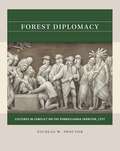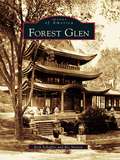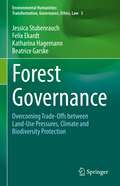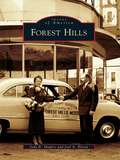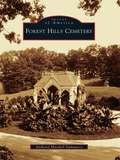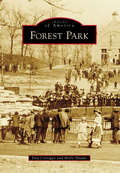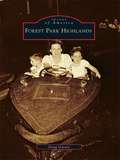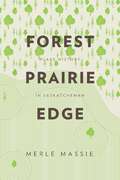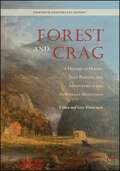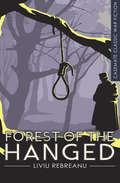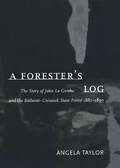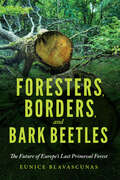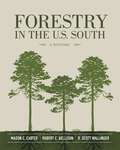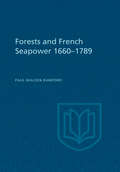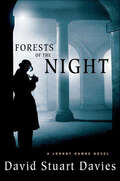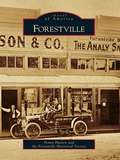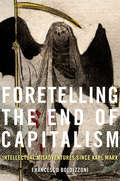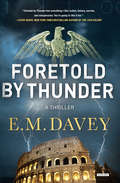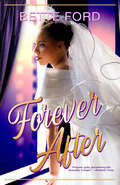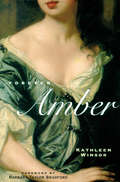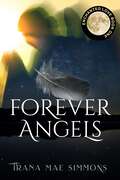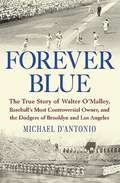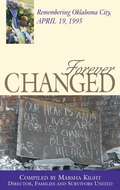- Table View
- List View
Forest Diplomacy: Cultures In Conflict On The Pennsylvania Frontier 1757 (Reacting To The Past(tm) Ser.)
by Nicolas W. ProctorForest Diplomacy draws students into the colonial frontier, where Pennsylvania settlers and the Delaware Indians, or Lenâpé, are engaged in a vicious and destructive war. Using sources—including previous treaties, firsthand accounts of the war, Quaker epistles advocating pacifism, and various Iroquois and Lenâpé cultural texts—students engage in a treaty council to bring peace back to the frontier.
Forest Glen (Images of America)
by Rich Schaffer Ric NelsonForest Glen, Maryland, a sleepy suburb of Washington, D.C., has weathered the arrival of the railroad, construction of a summer resort, development of a fashionable girl's finishing school, and the establishment of a U.S. Army base. Throughout these times there has always been a close-knit community of homes and people that were often overshadowed by the many diverse events and changes that prevailed here. The focal point of the community--one of only a few extant eclectic architectural follies in the United States and consisting of many international styles--is listed on the National Register of Historic Places as the National Park Seminary Historic District.
Forest Governance: Overcoming Trade-Offs between Land-Use Pressures, Climate and Biodiversity Protection (Volume 3) (Environmental Humanities: Transformation, Governance, Ethics, Law)
by Katharina Hagemann Felix Ekardt Jessica Stubenrauch Beatrice GarskeThis book analyses and develops overarching concepts for forest policy and forest governance and includes a detailed investigation into the historical discussion on forests. It examines opportunities and limits for negative emissions in a sector that – like peatlands – appears significantly less ambivalent compared to highly technical large-scale forms of climate geoengineering. The analysis shows that the binding climate and biodiversity targets under international law are much more ambitious than most people assume. Measured against that, the volume critically reviews the potentials of afforestation and reforestation for climate mitigation, which is often presented as the new saviour to fulfil the commitments of the Paris Agreement and to reach climate neutrality in the future. It becomes clear that ultimately only biodiverse and thus resilient forests can function as a carbon sink in the long term. The volume shows that the existing European and international forest governance approaches fail to comply with these targets and insights. Furthermore, the book develops a bundle of policy measures. Quantity governance systems for livestock farming, fossil fuels and similar drivers of deforestations represent the most important approach. They are most effective when not directly targeting forests due to their heterogeneity but central damaging factors. With regard to the dominant regulatory and subsidy-based governance for forests we show that it remains necessary to supplement these quantity governance systems with certain easily graspable and thus controllable regulatory and subsidy regulations such as a regulatory protection of old-growth forests with almost no exceptions; extension of the livestock-to-land-ratio established in organic farming to all farming; far-reaching restriction of bioenergy use to certain residues flanked by import bans; and a national and international complete conversion of all agricultural and forest subsidies to “public money for public services” to promote nature conservation and afforestation in addition to the quantity control systems.
Forest Hill, Louisiana: A Bloom Town History (Brief History)
by Cheré Dastugue CoenForest Hill boasts one of the largest nursery industries in the country, despite its tiny population. In the early days, the community was a summer retreat for plantation owners. The lumber industry rolled into town with the railroad, which eased the transportation of virgin timber. By 1901, the nurseries had emerged after Samuel Stokes began selling a variety of plants from his woods. Today, more than two hundred nurseries are in operation, many by the families who founded them. Author Chere Dastugue Coen reveals the deep roots of this horticultural hub.
Forest Hills (Images of America)
by Joel A. Bloom Jody B. ShapiroAptly named because of its hilly terrain and abundance of trees, the area now known as Forest Hills was a dusty coal mining community in the late 1800s. Centered between two major roads, the Lincoln Highway (Ardmore Boulevard/U.S. Route 30) and the Greensburg Pike, Forest Hills was incorporated in 1919 in order to gain better representation for tax money. Technology put the town on the map with the first commercial licensed radio station broadcast in 1920 and the Westinghouse Atom Smasher, built in 1937. As the borough grew with new houses, schools, and parks, so did traditions such as the Fourth of July celebration at Forest Hills Park and the Bryn Mawr Corn Roast. Many who live in the community are third or fourth generation residents. Using vintage photographs, Forest Hills presents the untold story of this tight-knit community.
Forest Hills Cemetery
by Anthony Mitchell SammarcoLaid out in 1848 as a rural garden cemetery by Henry A. S. Dearborn, Forest Hills Cemetery celebrates its 160th anniversary in 2008 as Boston's premier arboretum cemetery. Since the mid-19th century, its 250 magnificent acres have been the resting place of people of all walks of life, ethnicities, religions, and races. Among these are poets Anne Sexton and E. E. Cummings, playwright Eugene O'Neill, and abolitionist William Lloyd Garrison. Forest Hills's landscape is a museum of sculpture, art, and monuments that chronicles the Victorian age to the present. The first crematorium in New England was here, and prominent Bostonian suffragette Lucy Stone was the first person to be cremated at Forest Hills in 1893. An active cemetery and an all-embracing place, Forest Hills offers a bucolic and picturesque setting for the "gathering of generations" and is listed on the National Register of Historic Places.
Forest Park (Images of America)
by Don Corrigan Holly ShanksAt 1,293 acres, Forest Park exceeds the size of New York’s Central Park by nearly 500 acres, and within are lakes, hills, wetlands, woodlands, and bountiful recreational opportunities. Within a few decades of its 1876 opening, Forest Park became the host for the 1904 St. Louis World’s Fair, as well as the 1904 Summer Olympics. Known as the “Heart of St. Louis,” the park features amazing attractions, such as the Saint Louis Zoo, the Saint Louis Art Museum, the Missouri History Museum, The Muny, and the Saint Louis Science Center. Millions of Americans have come to Forest Park for world-class festivities and for celebrations of heroes, from Lewis and Clark to explorers of outer space. Today, the park continues to host remarkable events, including Fair St. Louis, Earth Day, Shakespeare in the Park, and LouFest.
Forest Park Highlands
by Doug GarnerForest Park Highlands was once St. Louis's largest and best-known amusement park. In its earliest years, the Highlands boasted a fine theater and one of the largest public swimming pools in the United States. After the 1904 world's fair closed, several attractions found a new home at the Highlands; the large pagoda--a re-creation of the temple of Nekko, Japan--served as the park's bandstand for several years. Roller coasters are the lifeline of every good amusement park, and the Highlands always had two. The end came for the Highlands in a spectacular fire that decimated almost the entire park on July 19, 1963. Only the Comet roller coaster, the Ferris wheel, the Dodgems, the carousel, and the Aero Jets survived. Forest Park Highlands covers other historic amusement parks in St. Louis as well, starting with the earliest, West End Heights, and ending with Holiday Hill, the last remaining park.
Forest Prairie Edge: Place History in Saskatchewan
by Merle MassieSaskatchewan is the anchor and epitome of the ‘prairie’ provinces, even though half of the province is covered by boreal forest. The Canadian penchant for dividing this vast country into easily-understood ‘regions’ has reduced the Saskatchewan identity to its southern prairie denominator and has distorted cultural and historical interpretations to favor the prairie south. Forest Prairie Edge is a deep-time investigation of the edge land, or ecotone, between the open prairies and boreal forest region of Saskatchewan. Ecotones are transitions from one landscape to another, where social, economic, and cultural practices of different landscapes are blended. Using place history and edge theory, Massie considers the role and importance of the edge ecotone in building a diverse social and economic past that contradicts traditional “prairie” narratives around settlement, economic development, and culture. She offers a refreshing new perspective that overturns long-held assumptions of the prairies and the Canadian west.
Forest and Crag: A History of Hiking, Trail Blazing, and Adventure in the Northeast Mountains, Thirtieth Anniversary Edition (Excelsior Editions)
by Laura Waterman Guy WatermanThirty years after its initial publication, this beloved classic is back in print. Superbly researched and written, Forest and Crag is the definitive history of our love affair with the mountains of the Northeastern United States, from the Catskills and the Adirondacks of New York to the Green Mountains of Vermont, the White Mountains of New Hampshire, and the mountains of Maine. It's all here in one comprehensive volume: the struggles of early pioneers in America's first frontier wilderness; the first ascent of every major peak in the Northeast; the building of the trail networks, including the Appalachian Trail; the golden era of the summit resort hotels; and the unforeseen consequences of the backpacking boom of the 1970s and 80s. Laura and Guy Waterman spent a decade researching and writing Forest and Crag, and in it they draw together widely scattered sources. What emerges is a compelling story of our ever-evolving relationship with the mountains and wilderness, a story that will fascinate historians, outdoor enthusiasts, and armchair adventurers alike.
Forest of the Hanged: A Novel (Casemate Classic War Fiction #11)
by Liviu RebreanuA World War I soldier is torn between his duty, his country, and his conscience in this work of &“classic war fiction&” (Books Monthly). When the First World War broke out, Apostol Bologa left his home in Romania and joined the Austro-Hungarian army with grand visions of battle, glory, and honor. Instead, the young officer finds himself serving on a near-perfunctory tribunal that sentences deserters and other reprobates to hanging in a small dark forest just behind the Eastern Front. At first Bologa performs his duties with staunch military bearing, but the weight of the dead slowly begins to toll on his mind and spirit. For as his fellow soldiers are being cut down by the thousands on the battlefields, his only contribution to the effort is killing men one by one for reasons that grow ever more foreign and dubious—until he finds himself lost in the very forest of the dead he helped grow . . . with little hope for his own salvation.
Forester's Log: The story of John La Gerche and the Ballarat-Creswick State Forest 1882-1897
by Angela TaylorA Forester's Log is a unique forest story, told from a forester's viewpoint-the view of John La Gerche, one of the first generation of foresters in Victoria, who managed the Ballarat-Creswick State Forest in the late nineteenth century. La Gerche's Letter Books and Pocket Books have survived to provide a rare insight into a bailiff-forester's burdens in the 1880s and 1890s. As a bailiff, he daily had to confront prop cutters and woodcarters, 'scamps and vagabonds' who constantly defied forest regulations. His pioneering work helped shape today's forested landscape around the Central Victorian goldfields town of Creswick, 'the home of forestry'. In the detailed correspondence between this amateur forester and his bureaucratic masters lies the human story of an ordinary yet remarkable man, endeavouring to strike a fair balance between the competing demands of local woodcutters and distant officials. Angela Taylor reads between the lines to create a beautifully perceptive portrait of a vanishing character type-the truly committed public servant. A Forester's Log is an illuminating and charming book which will appeal to a wide range of readers, both urban and rural, including those interested in conservation and landscape heritage.
Foresters, Borders, and Bark Beetles: The Future of Europe's Last Primeval Forest
by Eunice Blavascunas“A compelling investigation of the pasts and possible futures of a critical ecosystem in an era of globalization and rising nationalism.” —Andrew S. Mathews, author of Instituting NatureIn Europe’s last primeval forest, at Poland’s easternmost border with Belarus, the deep past of ancient oaks, woodland bison, and thousands of species of insects and fungi collides with authoritarian and communist histories.Foresters, biologists, environmentalists, and locals project the ancient Bialowieza Forest as a series of competing icons in struggles over memory, land, and economy, which are also struggles about whether to log or preserve the woodland; whether and how to celebrate the mixed ethnic Polish/Belarusian peasant past; and whether to align this eastern outpost with ultraright Polish political parties, neighboring Belarus, or the European Union. Eunice Blavascunas provides an intimate ethnographic account, gathered in more than 20 years of research, to untangle complex forest conflicts between protection and use. She looks at which pasts are celebrated, which fester, and which are altered in the tumultuous decades following the collapse of communism.Foresters, Borders, and Bark Beetles is a timely and fascinating work of cultural analysis and storytelling that textures its ethnographic reading of people with the agency of the forest itself and its bark beetle outbreaks, which threaten to alter the very composition of the forest in the age of the Anthropocene. “Through vivid storytelling, Eunice Blavascunas illuminates the durability of struggles around national identity and history—and the ways those struggle shape debates over ecology and nature conservation—in one of Europe’s quintessential borderlands.” —Katrina Z. S. Schwartz, author of Nature and National Identity after Communism
Forestry in the U.S. South: A History
by Mason C. Carter R. Scott Wallinger Robert C. KellisonDuring the second half of the twentieth century, the forest industry removed more than 300 billion cubic feet of timber from southern forests. Yet at the same time, partnerships between public and private entities improved the inventory, health, and productivity of this vast and resilient resource. A comprehensive and multilayered history, Forestry in the U.S. South explores the remarkable commercial and environmental gains made possible through the collaboration of industry, universities, and other agencies. This authoritative assessment starts by discussing the motives and practices of early lumber companies, which, having exhausted the forests of the Northeast by the turn of the twentieth century, aggressively began to harvest the virgin pine of the South, with production peaking by 1909. The rapidly declining supply of old-growth southern pine triggered a threat of timber famine and inspired efforts to regulate the industry. By mid-century, however, industrial forestry had its own profit incentive to replenish harvested timber. This set the stage for a unique alliance between public and private sectors, which conducted cooperative research on tree improvement, fertilization, seedling production, and other practices germane to sustainable forest management. By the close of the 1990s, concerns about an inadequate timber supply gave way to questions about how to utilize millions of acres of pine plantations approaching maturity. No longer concerned with the future supply of raw material and facing mounting global competition the U.S. pulp and paper industry consolidated, restructured, and sold nearly 20 million acres of forests to Timber Investment Management Organizations (TIMOs) and Real Estate Investment Trusts (REITs), resulting in an entirely new dynamic for private forestry in the South. Incomparable in scope, Forestry in the U.S. South spotlights the people and organizations responsible for empowering individual forest owners across the region, tripling the production of pine stands and bolstering the livelihoods of thousands of men and women across the South.
Forests and French Sea Power, 1660-1789
by Paul Walden BamfordBy choosing to concentrate upon discovering what forest resources were available to the French navy during the ancien régime and what use it was able to make of them, Mr. Bamford has not only provided the first monograph on that subject in the English language, but has gone far toward explaining why France was the loser in the long duel with England for the control of commerce and the extension of empire. <P><P> Two years of research in the Archives Nationales and in the Archives de la Marine in Paris, Toulon, and Rochefort enabled him to draw on contemporary sources of information of which little, if any, use has been made before, and a further year of research in the libraries of New York City, particularly in the rich Proudfit Naval Collection, also yielded new material. It is Mr. Bamford's achievement to have handled this vast store of primary sources with such skill and judgement that the reader, by turning over letters from disgruntled forest proprietors, reports from harassed maîtres on the trickery and recalcitrance of the peasants, instructions from the top echelon of the navy to inspectors in the forests, and a variety bills, receipts, and memoranda, is given at first hand an appreciation of the difficulties faced by the navy in trying to obtain timber and masts of the choice quality required for building ships-of-the-line. The navy had to compete with the merchant marine and with industrial and private users of fuel for supplies that were continually being depleted by mismanagement and by the conversion of forests to arable land. Measures, superficially admirable, for conserving the forests are found on closer examination to be at once over-precise and not properly enforced. Transport, even in a country so abundantly supplied with navigable rivers as France, was expensive and difficult.<P>Not only historians, but scholars in the field of forestry, economics, geography, agriculture, and transport will find this book illuminating.
Forests of the Night (Johnny Hawke Novels)
by David Stuart DaviesForests of the Night introduces the intrepid John Hawke, an exciting new detective operating in London during the Blitz.When World War II breaks out in London, young policeman John Hawke enlists in the army. His dreams of fighting for his country, however, are cut short after he loses an eye in rifle training. Invalided out of the army and offered a desk job with the police, John sets up as a private investigator in London instead, hoping for excitement and danger.In the autumn of 1940, John is engaged to investigate the mysterious death of a young woman. What is the connection between her brutal murder and the fading film actor Gordon Moore? Johnny also becomes involved in the plight of a runaway boy who may have witnessed something terrible.Told with wit and humor, while evoking an atmospheric picture of the home front during the dark days of the Second World War, Forests of the Night is an impressive U.S. debut for David Stuart Davies.
Forestville
by Forestville Historical Society Penny HuttenVisitors to Forestville are taken aback by its picturesque valleys laden with roaming vineyards. However, Forestville is more than a gateway to the Russian River; it is a diverse array of businesses, wineries, farming, and recreation. Forestville grew from the Spanish land grant traded by Capt. Juan Bautista Rogers Cooper from his brother-in-law Gen. Mariano Vallejo in 1834 into the town known by passing travelers as "Swindle Rig." In 1867, the town was named Forestville after Andrew Jackson Forrister, a saloon owner. It was set apart from other settlements by having the first powered sawmill in California and the Faudré Chair factory, the largest manufacturing plant in Sonoma County of that era. Collectors still seek out the factory's rawhide-bottom chairs. As a popular stop on the railway line, many vacationers from San Francisco passed through on their journeys to the Russian River. In 1963, the town continued to be different, setting aside land for a community youth park, so it is no wonder the town's slogan is "Forestville the Great Life."
Foretelling the End of Capitalism: Intellectual Misadventures since Karl Marx
by Francesco BoldizzoniIntellectuals since the Industrial Revolution have been obsessed with whether, when, and why capitalism will collapse. This riveting account of two centuries of failed forecasts of doom reveals the key to capitalism’s durability. Prophecies about the end of capitalism are as old as capitalism itself. None have come true. Yet, whether out of hope or fear, we keep looking for harbingers of doom. In Foretelling the End of Capitalism, Francesco Boldizzoni gets to the root of the human need to imagine a different and better world and offers a compelling solution to the puzzle of why capitalism has been able to survive so many shocks and setbacks. Capitalism entered the twenty-first century triumphant, its communist rival consigned to the past. But the Great Recession and worsening inequality have undermined faith in its stability and revived questions about its long-term prospects. Is capitalism on its way out? If so, what might replace it? And if it does endure, how will it cope with future social and environmental crises and the inevitable costs of creative destruction? Boldizzoni shows that these and other questions have stood at the heart of much analysis and speculation from the early socialists and Karl Marx to the Occupy Movement. Capitalism has survived predictions of its demise not, as many think, because of its economic efficiency or any intrinsic virtues of markets but because it is ingrained in the hierarchical and individualistic structure of modern Western societies. Foretelling the End of Capitalism takes us on a fascinating journey through two centuries of unfulfilled prophecies. An intellectual tour de force and a plea for political action, it will change our understanding of the economic system that determines the fabric of our lives.
Foretold by Thunder: A Thriller
by E.M. DaveyThe author of The Napoleon Complex delivers &“everything I like: action, history, secrets, and conspiracies&” (Steve Berry, New York Times–bestselling author). When journalist Jake Wolsey stumbles upon a declassified file showing Winston S. Churchill&’s interest in the ancient, esoteric Etruscan civilization, his curiosity is piqued—but a series of deadly coincidences seems to surround the file and everyone who knows of its existence. Wolsey soon attracts the unlikely attention of alluring archaeologist Florence Chung—and that of MI6. As the journalist and archaeologist are pursued across Europe and Africa in search of a sacred Etruscan text, danger closes in and more questions than answers arise. Are there powers in the sky modern science has yet to understand? Could the ancients predict the future? And what really explains the rise of Rome, that of Nazi Germany, the ebb and flow of history itself? In a thrilling race against time and enemies known and unknown, Wolsey fears the very survival of the West may depend on his ability to stay one step ahead of his adversaries. An assured rollercoaster full of unexpected twists and turns, E.M. Davey offers up a gripping read for fans of Dan Brown in this bombastic debut. &“We have ourselves a cracking good read . . . This is a thriller injected with inside news as well as well-placed heart-attack-inducing paranoia, appealing to all who like their adrenaline rushes fast [and] engrossing.&” —The Bookbag
Forever After (Malcolm X Community Center #2)
by Bette FordFrom the Romantic Times Career Achievement Award-winning author for Multicultural Romance, Bette Ford, a novel about family secrets, wealth and true love…“Poignant, gutsy and teeming with sensuality FOREVER AFTER is a stellar love story that no romance reader will want to miss. Once again, the inimitable Ms. Ford has created a sensational novel destined to become a keeper in the hearts of readers and booksellers for years to come.” –Romantic TimesTormented by dark family secrets, lies and deception, the beautiful Diane Rivers had to struggle to make a life for herself. Though a successful career in teaching finally awarded her the long-fought-for independence she craved, it came at a price…a future with the man she loved the most, Charles Alexander Randol, III.Charles Randol, Vice President of Randol Pharmaceuticals is shocked when he discovers that Diane’s promiscuous reputation is utterly false…Diane is a virgin. When Diane finally gathers up the nerve to share her true feelings with Charles, he immediately whisks her away to the island of St. Thomas for a private wedding, luxurious honeymoon and the intended happily ever after…But when they return to the States, Charles’ whole world is rocked when he learns that Diane’s virginity isn’t the only secret she’s kept from him. Faced with his wife’s traumatic past, Charles finds himself torn between his deep love for her and the bitter betrayal he feels at being kept in the dark on her dangerous past…and Charles desperately hopes the love in his heart is tough enough to save his marriage…and to save his wife.
Forever Amber
by Kathleen WinsorHistorical fiction. Abandoned on the streets of London and pregnant, 16-year-old Amber manages, by her wit, beauty and courage, to become the favorite mistress of King Charles II.
Forever Amber (Rediscovered Classics Ser.)
by Barbara Taylor Bradford Kathleen WinsorAbandoned pregnant and penniless on the teeming streets of London, 16-year-old Amber St. Clare manages, by using her wits, beauty, and courage, to climb to the highest position a woman could achieve in Restoration England--that of favorite mistress of the Merry Monarch, Charles II. From whores and highwaymen to courtiers and noblemen, from events such as the Great Plague and the Fire of London to the intimate passions of ordinary--and extraordinary--men and women, Amber experiences it all. But throughout her trials and escapades, she remains, in her heart, true to the one man she really loves, the one man she can never have. Frequently compared to Gone with the Wind, Forever Amber is the other great historical romance, outselling every other American novel of the 1940s--despite being banned in Boston for its sheer sexiness. A book to read and reread, this edition brings back to print an unforgettable romance and a timeless masterpiece.
Forever Angels (Enchanted Love #1)
by Trana Mae SimmonsA Bumbling Guardian Angel's Sneeze Causes Disappearance of Prominent NYC Attorney in Forever Angels, an Enchanting Time Travel Romance from Trana Mae SimmonsAdirondack Mountains, New York State, 1994 Oklahoma Territory, Eastern Oklahoma, 1893The day after her broken engagement, rising star attorney Tess Foster sets off into the Adirondack Mountains in New York State to backpack away her broken heart.Guardian Angel Michael's job is to protect her, but when she breaks her ankle and falls off the mountain, his inadvertent sneeze sends Tess back in time 101 years, into the arms of Stone Chisum, the ultimate broad-shouldered rancher/cowboy.Her heart heals as she falls in love with Stone and his two lovely Indian children, but neither knows whether their love is doomed if Tess finds herself transported back to her former life, a life she no longer desires.Stone Chisum has enough on his mind, trying to make a go of his ranch and keeping the town busybodies from taking the children he loves, the son and daughter of Stone's former love. He doesn't need a beautiful city woman from another time, used to luxuries he can't provide.Despite how hard Stone fights against it, he can't deny his growing feelings for Tess, and with a little angelic help, the newly formed ranching family might have a chance at love.About the Author:T. M. Simmons lives in a haunted house on the edge of the East Texas Piney Woods, which she and her husband share with various pets and paranormal residents. In between writing cozy mysteries and other stories, she delights in scaring herself silly during otherworldly encounters and visits haunted buildings and graveyards during dark and full moons. Her husband goes along sometimes to protect her from the bumps in the night, although he's been known to spy a ghost and retreat rather than confront it. She also pursues paranormal entities with her real-life Twila, Aunt Belle Brown, who are Lead Investigators of the Supernatural Researchers of Texas paranormal investigative team. SRT's motto is "Leave Peace Behind," and the team seeks to leave peace for the people who are dealing with troubled hauntings, as well as for the ghosts. Simmons is extremely willing to discuss her experiences with anyone she can corner.
Forever Blue
by Michael D'AntonioRead Michael D'Antonio's posts on the Penguin Blog From the Pulitzer Prize-winning journalist comes a revealing biography of "one of the most polarizing figures in baseball history" (The New York Times). If ever there was a figure who changed the game of baseball, it was Walter O'Malley, owner of the Dodgers. O'Malley was one of the most controversial owners in the history of American sports, altering the course of history when he uprooted the Dodgers and transplanted them from Brooklyn to Los Angeles. While many critics attacked him, O'Malley looked to the future, declining to defend his stance. As a result, fans across the nation have never been able to stop arguing about him and his strategy-until now. Michael D'Antonio's Forever Blue is a uniquely intimate portrait of a man who changed America's pastime forever, a fascinating story fundamental to the history of sports, business, and the American West. Michael D'Antonio's newest book, A Full Cup: Sir Thomas Lipton's Extraordinary Life and His Quest for America's Cup, is now available from Riverhead Books.
Forever Changed: Remembering Oklahoma City, April 19, 1995
by Marsha KightRoyalties from Forever Changed will aid those survivors and family members who have contributed to this book. Much has been written about the Oklahoma City bombing and how 168 people were killed. But news accounts often fail to put a face on the victims or to show the significance of their lives and contributions to their families and communities. Little is known about the lives of the many who survived the blast and the families of those who didn't. The tomorrows of so many ordinary people have been irreparably altered by a single act of domestic terrorism. Three years in the making, Forever Changed is the exclusive volume that brings together survivors and family members of victims. This powerful work tells the special stories of those who died, the pain endured by their families, and the ongoing struggles of the survivors a circle of grieving and hope that reaches far beyond the heartland. These unique first person accounts lucidly illustrate the goodness that was lost on April 19, 1995, the legacies that remain, and the courage of all those who were affected by the bombing. Internationally recognized victim's rights advocate Marsha Kight and her assistant, Lori Doggett, collected these stories and photographs from the many families in their home city and kept them in storage until the juries were chosen for the perpetrators' trials. Kight also contributes the story of her daughter, Frankie Merrell, 23, who was killed in the blast.
